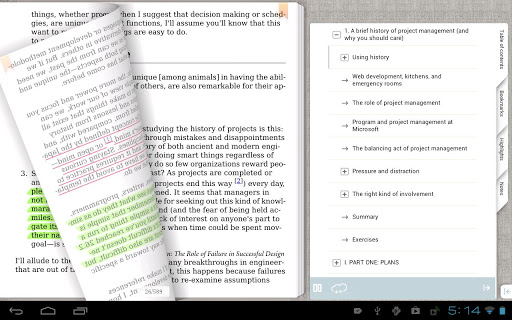There are many statistics that iOS users tend to spend more money on in-app purchases than their Android counterparts. One of the drawbacks in the e-reader industry is that no major online retailer actually sells digital books on any Apple products. This is primary because Apple takes a cut out of each e-book that is sold. Amazon, B&N, Kobo, and Google all sell e-books on Android though, but should other companies focus on this OS?
In 2014, 8 out of every 10 phones that were shipped ran Android, and there are currently 4,000 distinct Android devices. Android has grown substantially over the years. These are staggering figures considering 600 million users have adopted smartphones over the past year.
Developing a comprehensive solution for Android is actually fairly difficult. There are so many screen sizes and different resolutions to consider, it makes delivering content very challenging. This is often why the mainstream e-book companies tend to focus on iOS first to deliver new features and enhancements and then port it over to Android at a later date.
Many e-book sellers are actually not aware that Google takes a flat 30% out of each in-app transaction like Apple does. Many bypass this by redirecting the user to their own website, within the app. This way you can sell e-books and deliver them seamlessly to the app.
If you sell e-books on Android, certainly you are not exclusively locked into dealing with Google Play Merchant Services. The Amazon App Store, Nook App Store and the Good e-Reader App Store are viable alternatives. Amazon and B&N both have their own billing API services and take 30% of each app sale and in-app purchase. Good e-Reader on the other hand does not take anything from in-app purchases, which makes monetizing e-books financially viable. You can check out our Developer FAQ to find out more!
In the end, Android certainly has a very high adoption rate, but the amount of development time it takes to make a viable solution can be quite daunting. Additionally, if you choose to distribute it outside of Google Play you have to make separate editions using their API for in-app purchases. I think Android makes sense for free e-reading apps that have royalty free books or e-book subscription systems that give you thousands of books for a low monthly fee. Selling them one by one, is not financially viable unless you are a large company. If you are just getting started I would recommend trying iOS first.
Michael Kozlowski is the editor-in-chief at Good e-Reader and has written about audiobooks and e-readers for the past fifteen years. Newspapers and websites such as the CBC, CNET, Engadget, Huffington Post and the New York Times have picked up his articles. He Lives in Vancouver, British Columbia, Canada.
